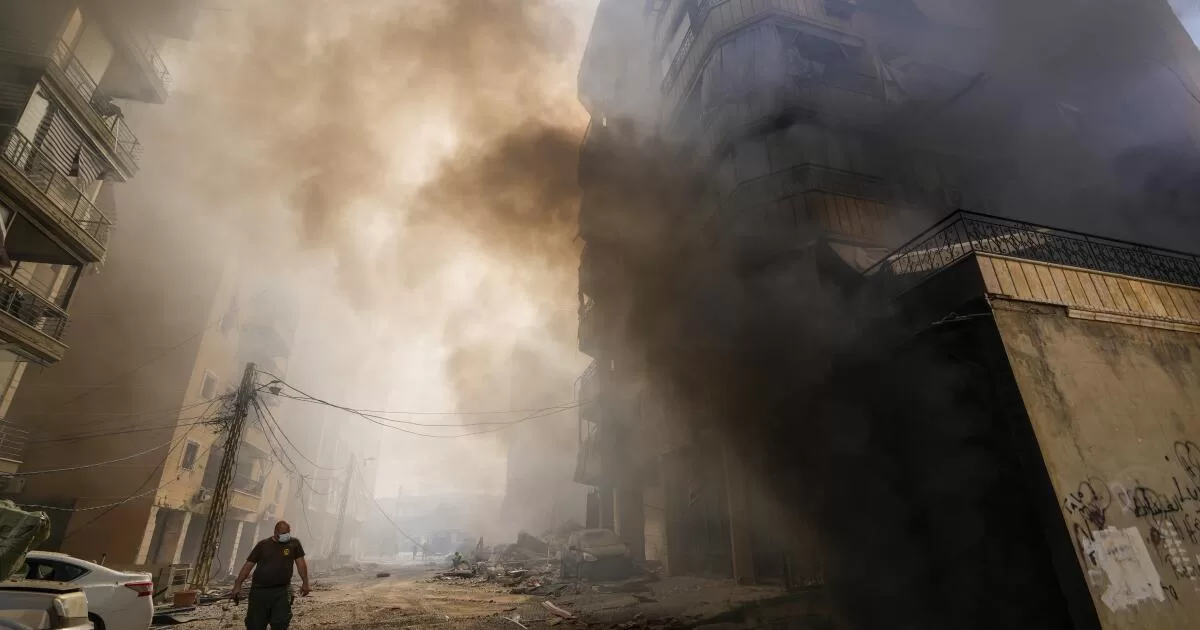As war in the Middle East widens, Iran and Israel on Wednesday traded threats of mutual destruction following the Islamic Republic’s missile barrage against Israel, while the Lebanese militant group Hezbollah and Israel reported the first “close-quarter” combat between their forces in southern Lebanon.
Hezbollah reported clashing with Israeli troops just over the Lebanese side of the border near the villages of Odaisseh and Maroun Al-Ras, saying its fighters “repulsed” an infantry unit after “inflicting losses.”
The Israeli military confirmed the fighting and announced the deaths of seven soldiers. Israel released footage of its tanks rolling into the neighboring country, the first Israeli invasion of Lebanon in 18 years. Smaller incursions by Israeli special forces have been taking place fairly regularly over the last year, Israel said.
Mohammad Afif, spokesman for Hezbollah, whose leadership has been pulverized in days of Israeli airstrikes, said the Iranian-backed group was prepared to mount a fierce resistance to the invasion despite its losses. Hundreds of civilians have also been killed in the strikes, Lebanese officials said.
“War is rounds. And if you have gotten us in the first round through assassinations and destruction, we are only in the first round,” Afif said. “Our forces are at the utmost readiness for confrontation, heroism and sacrifice.”
Last year, Hezbollah started sending rockets and drones over northern Israel the day after the Hamas militant group that ruled in Gaza invaded southern Israel on Oct. 7. That attack, which killed about 1,200 people and saw more than 200 hostages seized, spurred Israel’s war in Gaza. Hezbollah vowed to continue attacks until there is a Gaza cease-fire.
On Tuesday night, Hezbollah patron Iran launched nearly 200 ballistic missiles at Israel, only its second-ever direct hit on the nation. One Palestinian man was killed and a handful of Israelis injured, while no major damage was reported, officials said. U.S. and British air forces joined the Israelis in intercepting most of the missiles. The U.S. described the attack as a major escalation but “ineffective.”
Israeli Prime Minister Benjamin Netanyahu said Iran “made a big mistake” by attacking and “will pay for it.”
President Biden said he “fully, fully” supported Israel and its “defense.”
Netanyahu has largely ignored U.S. calls for restraint. Now, U.S. officials say they recognize that Israel will feel obliged to retaliate, and they accept that but are hoping actions are not of a scale that will in turn prompt Iran to again attack.
The U.S. ambassador to the United Nations on Wednesday issued a warning to Iran and encouraged the U.N. Security Council to condemn its missile attack on Israel.
“We meet at a moment when there is a heightened risk of countries in the region being dragged into a broader conflict,” Linda Thomas-Greenfield said as she blamed Iran’s funding of militant groups for fanning crises in Lebanon and the Gaza Strip.
“We strongly warn against Iran, or its proxies, taking actions against the United States, or further actions against Israel,” she said.
Iran’s foreign minister, Abbas Araghchi, said his country will launch a “harsher” attack against Israel if it retaliates for Tuesday’s bombardment, and warned “any third party” and especially the United States to stay out of the conflict.
“We will confront and answer any third party that enters any operation against us in support of the Zionist regime, and we will have a crushing response,” he said on Iranian TV.
Also Wednesday, Afif, the Hezbollah spokesman, took journalists on a tour of Dahieh, the Hezbollah-dominated southern suburb of Beirut that has been pounded in recent days by Israeli air assaults. Israel says it is targeting Hezbollah positions, weapons caches and infrastructure across the country, including in Dahieh. To do so, it has used bunker-buster missiles and heavy ordnance that has obliterated residential compounds and buildings.
Standing before the ruins of what was the broadcast station for a religious channel, Afif sought to counter the contention that many of the residential buildings were being used to store weapons. Israel was destroying “for the sake of destruction itself,” he said.
The Dahieh, a densely populated area — before Israel’s escalation, it had more than 700,000 people — with shops, restaurants and residential towers, has been all but emptied in the last week, after a massive Israeli strike killed Hezbollah head Hassan Nasrallah and other leaders. The full death toll from that strike has yet to be determined because of the extent of the rubble and the danger of subsequent Israeli bombardment.
Normally traffic-choked streets in the area are abandoned, save for a few vehicles whose drivers race to their homes to pack whatever they can before driving away again. On their way, some go by the site of the latest strike to snap pictures of the damage, but they only stop for a moment.
Bulos reported from Beirut and Wilkinson from Washington.
